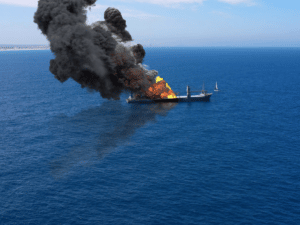Tankers are merchant ships made to carry various types of liquids or gasses in large quantities. Tankers carry hydrocarbons such as liquid natural gas, liquified petroleum gas, and petroleum oil, as well as chemicals, molasses, wine, and freshwater. If a maritime worker is injured on a tanker, the results are often catastrophic. Since tankers carry such highly-flammable and toxic materials, the risk of burns and poisoning is exceptionally high should an accident occur. In many cases, however, tanker accidents could have been prevented with the proper maintenance and training.

Recent Tanker Accidents and Sinkings
January 2014: The Bitu Gulf, a 315 ft. long, 3,884 ton bitumen tanker carrying asphalt from Singapore to Quy Nhon, Vietnam, sank in the South China Sea 43 nautical miles off the Vietnamese city of Phan Rang. The crew sent out a distress call after the Bitu Gulf started taking in water for reasons that are still undetermined. All of the 16 seamen were rescued by the container ship Ever Summit, but the vessel was a total loss.
December 2013: The Silver, a Moroccan tanker, ran aground on rocky shoals off the Moroccan port city of Tan Tan. The ship tried to enter port but bad weather interfered. The Silver then dropped anchor to wait till the weather improved, but heavy waves pulled the tanker onto the rocks. The ship sailed from Santa Cruz de Tenerife to Tan Tan with 5,000 tons of oil aboard. This raised the possibility of serious environmental damage off the southern coast of Morocco.
June 2013: The Nazo-S, a Turkish tanker with 12 crew members aboard, caught fire in the Adriatic Sea after an electrical short circuit. The Nazo-S was 23 miles off the Italian city of Civitanova Marche. The nearly 300 foot long vessel was sailing from Damietta, Egypt to Ravenna when the incident occurred. A container ship rescued the crew and the fire was eventually extinguished.
Types of Tanker Accidents and Related Injuries
As with most merchant and passenger vessels, tankers can suffer damage or sink as a result of different accidents. Fires and explosions are among the most feared tanker incidents, but other accidents can occur either at sea or in port. In addition to accidents involving combustible materials, tankers are at risk of:
- Collisions at sea
- Running aground on reefs or shoals
- Foundering
- Engine failure
- Electrical short circuits
- Chemical leaks
- Structural problems
In catastrophic accidents involving fires and explosions, the resulting injuries to a ship’s crew are serious, disabling, and often fatal, as mentioned earlier. Modern tankers are designed with safety features, such as automated fire extinguishing systems and watertight compartments, to minimize damage to vessels. Crews are also expected to deal with many emergency situations which can arise on a ship at sea. Still, accidents do occur and many seamen are injured or killed while working aboard different types of tankers.
Burns are the injuries most associated with accidents aboard tankers because many of them carry flammable cargoes. However, other injuries can disable or kill officers and crew members aboard this type of vessel. These include:
- Smoke inhalation
- Mechanical asphyxiation
- Electrical shock
- Traumatic brain injuries
- Fractured bones
- Back and spinal cord injuries
- Amputations
- Drowning and near-drowning injuries
Compensation for Seamen Injured in Tankers
Seamen who are injured while working aboard any type of tanker have the right to seek legal compensation. General maritime law and the Jones Act provide injured crew members with the ability to file claims against ship owners or employers whose negligence contributed to the accident or caused the vessel to be unseaworthy.